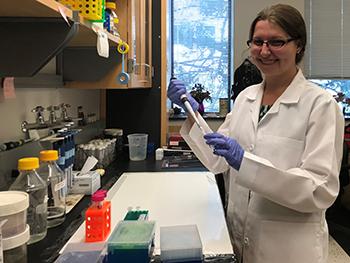
A Duke University School of Medicine graduate student has award-winning ideas for how to boost excitement about the biomedical sciences among the millennial generation.
Grace Beggs, a fourth year PhD student in the Department of Biochemistry, was one of three graduate students in the nation to win this year’s Lasker Foundation Essay Contest, which challenged young scientists and clinicians around the world to develop innovative ideas to engage young people in learning about the biomedical sciences.
Her winning essay, published on the Lasker Foundation website, calls for the development of a biomedical science themed smart phone application that integrates gaming, augmented reality, and social networking to educate millennials. The game would draw on the 2016 success of PokemonGo, which allowed users to interact with and catch computer-generated Pokemon characters in a real-world environment.
At Duke, Beggs works in the lab of Richard Brennan, PhD, chair of the Department of Biochemistry and James B. Duke Professor of Biochemistry, where she studies the structure and function of proteins involved in antibiotic resistance.
"Grace is not only an outstanding young scientist, but also has a deep passion for reaching out to multiple communities to engage them in exploring the exciting world of biomedical research," said Brennan.
In her essay, Beggs suggests replacing the squirming Pokemon creatures with computer-generated microbes, allowing users to ‘catch’ them in a real-world environment. After the microbe is caught, it would link to an educational video, and then a quiz and chat room if players want to continue to learn and discuss.
“This app could be made available to the wider public as well as adapted for the college classroom,” writes Beggs. “Developing special features on the app for biology professors to post their own material, ‘gamify’ course content, and promote collaborative learning could potentially enhance student engagement in university biology courses.”
The Lasker Foundation Essay Contest was created in 2014 to engage young scientists and clinicians from the US and around the globe in a discussion about big questions in biology and medicine and the role of biomedical research in our society today, according to the foundation. It also serves as a way to help build science communication skills in young researchers. The essay contest is open to medical school students, interns, residents, and fellows; doctoral students and postdoctoral fellows in biomedical sciences; and graduate students in public health or other health professions programs.
As a co-winner, Beggs will receive $10,000 towards her educational expenses, and a trip to New York City to attend the Lasker Award Luncheon in September 2019. This year’s other winners are Dereck Paul, an MD student at UC San Francisco, and Peter John, an MD/PhD student at Albert Einstein College of Medicine.